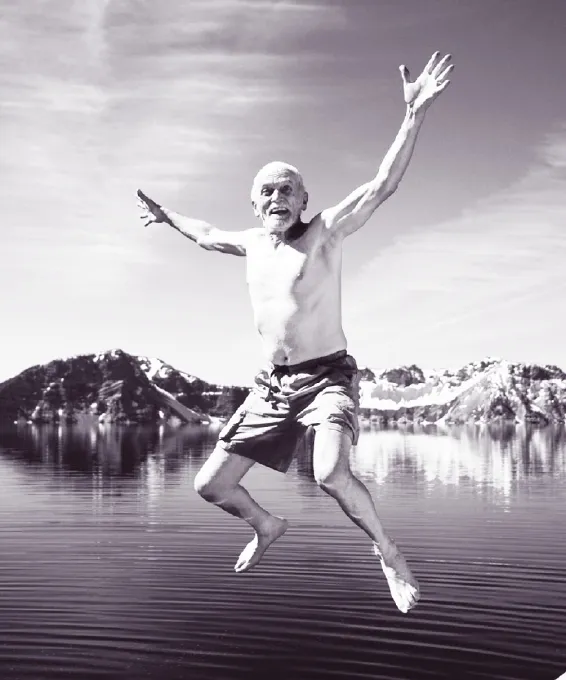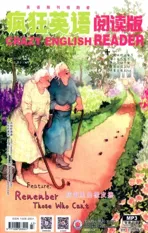当记忆渐渐消失
2015-04-09byDrStephenHumeJoyce
by Dr. Stephen Hume Joyce 译
当记忆渐渐消失
What Alzheimer’s Disease Feels Like
by Dr. Stephen Hume Joyce 译

记忆慢慢衰退,各方面能力渐渐下降,和他人的关系、对自己的定位也不得不作出相应的改变,这些都是阿尔茨海默病患者所要面对的困境。下面就让我们一起走进阿尔茨海默病患者的心路历程。


I t was an uncharacteristically warm and sunny morning in Alaska. I was sitting on the1)aft deck of a cruise ship watching brilliant blue icebergs drift silently by, on vacation with my partner Candy. We had decided to go on a sevenday cruise through Alaska’s Inside Passage because I had always wanted to see the glaciers and time was running out.
Diagnosed six years ago with Alzheimer’s disease at age sixty, it was time for me to do those lifetime adventures. As I watched one small iceberg2)glisten in the sunlight, I was drawn to its facets and how as each one caught the sunlight a small piece would3)topple off. This is what it’s like to have this disease, I thought. My brain is the iceberg and every day I lose some little part of it. There are days when the sun is bright and I may lose a bigger or more obvious piece and there are cloudy, cold days when I don’t lose anything. Such is the life of an iceberg and a brain attacked by Alzheimer’s disease.
这是阿拉斯加异常温暖、阳光明媚的一个早上。我正坐在一艘游轮船尾的甲板上,看着美丽的蓝色冰山静静地漂过。我和伴侣康蒂正在度假。我们已经决定开展一段为期7日的阿拉斯加内线航道穿越之旅,因为我一直想要看冰川,而我已经时日无多了。
六年前我被诊断出患有阿尔茨海默病,那时我年值花甲,我想也该是去进行人生冒险的时候了。我看到一座小冰山在阳光下闪闪发光,只要是阳光所到之处,其表面就会掉落出一小片冰块,我被这个景象吸引住了。我想,这就是患有阿尔茨海默病的感觉。我的大脑就是这座冰山,每天我都会失去其中的一小部分。阳光灿烂时,我也许会失去更大、更突出的一块。而乌云密布、天寒地冻时,我什么都不会失去。这就是冰山的生命历程,也是一个阿尔茨海默病患者大脑神经的衰退过程。
1) aft [ɑːft] adj. 船尾的
2) glisten [glɪsn] v. 闪光
3) topple ['tɒpl] v. 倾倒
When I was frst diagnosed, it had become apparent to me that I was having cognitive problems. Once a creative,4)holistic thinker, I could no longer hold in my head the many ideas needed for this type of thinking. I had become much more linear in my approach to life.
Now Step 1 had to be followed by Step 2 and then 3. I could write these steps down and follow them at least most of the time. As my symptoms progress and I lose more and more, I have come to appreciate one aspect of this disease—forgetting. Every time I am aware of a change in my abilities it is only apparent for a short time. During that time I become distressed, but I know that in a very short time I won’t remember ever having it. I guess this is a protective process, and it does make life easier for me.
Our vacation was different for me this time. I knew that what I was experiencing was spectacular but I missed its intensity. It’s as if the colors of the sky or a sunset or the blues of the glacier were all grayer. There was still color and beauty, but it was just not the same.
As a psychologist, I learned that we store our memories in many different places in our brains. Often a smell or taste will5)elicit a powerful memory, even though the image has long been forgotten. Every night I’d try to recall what I’d seen that day. It was diffcult. Realizing this, I tried to create mental postcards and absorb the smells, tastes, and sounds of the places we went.
When I refect on what I have lost, I am still aware of two important things. One is my intelligence and creative drive; the other is my connection to others. Both of these have changed dramatically and I miss them greatly. Always a self-motivated (and some would say driven) person, I now need other people to help me fnd ways to be helpful to others. I have gone from being the person others went to for ideas and direction to being directed. This has changed my relationships in major ways.
在刚被确诊时,我就明显感到我的认知能力出了问题。以前,我的思维活跃、全面而富有创造力。但如今,我的脑袋已经装不下太多的想法,无法再进行这种思考。我的人生体验变得越来越单调。
现在,我做事必须照着步骤来,步骤1,步骤2,步骤3。至少大多时候,我都可以写下这些步骤然后跟着做。随着我的症状日渐加重,我失去的东西也越来越多,但是我逐渐开始感谢这个病的一个方面——遗忘。每当我意识到自己能力有所改变时,这意识只会持续很短一段时间。在那段时间里,我会变得很痛苦。但我知道,很快,我就不会记得曾为此而痛苦过。我猜这是身体的保护机制,这也确实让我的生活变得容易些。
这次度假给我的感觉有所不同。我知道自己正在体验的事物很壮观,但我感受不到那种震撼。仿佛蔚蓝的天空、绚丽的夕阳,或是湛蓝的冰山,都蒙上了一层灰蒙的阴影。事物依旧色彩斑斓,美丽动人,但给我的感觉就是不一样。
作为一名心理学家,我知道记忆储存在大脑不同的区域。我们闻到或者尝到一种味道往往会勾起一段深刻的记忆,即使你早已忘记当时的情景。每天晚上我都会试着回忆当天所见过的事物。但这很难做到。意识到这一点后,我努力在脑海里构建意识明信片,把我们所到之处闻过、尝过的味道,听到过的声音记录其中。
当我回顾自己失去了什么时,我还意识到自己失去了两样重要的东西:一是我的聪明才智和创造力;二是我与他人的关系。这两样东西都发生了巨大的变化,我对之非常怀念。我一向是个善于自我激励(也有人说是善于自我鞭策)的人,而现在我却需要别人的帮助才不至于给人添麻烦。我从那个为别人出谋划策的人变成了需要别人出谋划策的人。这让我的人际关系发生了巨大的改变。

I have had to learn to depend on my family and colleagues, which has taught me the value of joining. Although my bond with other people has diminished, I still want to be useful and productive—I just don’t always know how anymore. This disease has humbled me. It has given me a new understanding of myself and the world of others. I believe that with any chronic progressive illness, we are presented with moments of insight and opportunity. What we do with them defnes us in ways we might never have imagined.
The German philosopher Martin Heidegger wrote, “Anyone can achieve their fullest potential...who we are might be predetermined, but the path we follow is always of our own choosing. We should never allow our fears or the expectations of others to set the frontiers of our destiny. Your destiny can’t be changed but it can be challenged. Every man is born as many men and dies as a single one.”
I intend to be the author of this chapter of my life and actively shape the man I will die as.

4) holistic [həʊ'lɪstɪk] adj. 整体的,全盘的
5) elicit [ɪ'lɪsɪt] v. 引出,引起
我不得不学会依靠家人和同事,这让我认识到了人与人之间关系的宝贵。虽然我与其他人的联系减少了,但我还是想做个有用的、对社会有所贡献的人——我只是不再总是知道该怎么做而已。这个病让我变得谦卑,让我学会以另一种方式看待自己与看待他人。我相信任何一种慢性疾病都会把智慧与机会带到我们面前。我们对待它们的方式会让我们自身产生始料不及的改变。
德国哲学家马丁·海德格尔说过,“每个人都能发挥出自身最大的潜能……我们的出身也许一早就注定,但我们却可以选择自己未来的人生道路。我们永远都不应该让自己的恐惧或者别人的期望来左右我们的命运。你不能改变命运,但你可以挑战命运。我们生来与他人别无二致,死时却是独一无二。”
我要成为自己人生终章的作者,积极塑造自己死亡时将成就的那个人。
